最新get的详细用法
动词get的用法与搭配
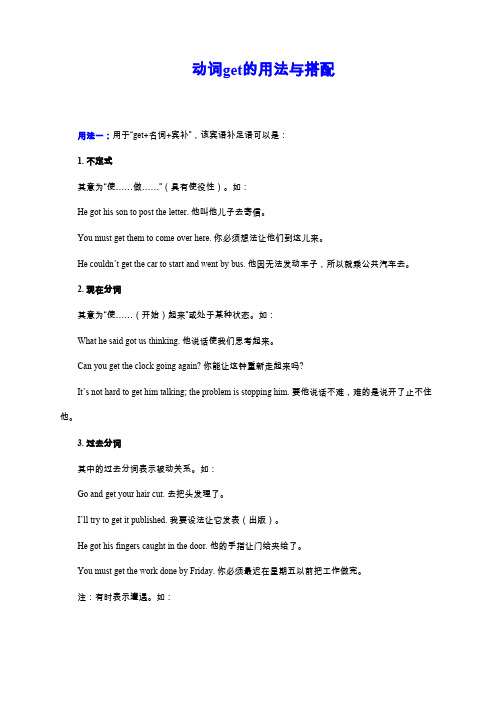
动词g et的用法与搭配用法一:用于“g et+名词+宾补”,该宾语补足语可以是:1. 不定式其意为“使……做……”(具有使役性)。
如:He got his son to post the letter. 他叫他儿子去寄信。
You must get them to come over here. 你必须想法让他们到这儿来。
He couldn’t get the car to start and went by bus. 他因无法发动车子,所以就乘公共汽车去。
2. 现在分词其意为“使……(开始)起来”或处于某种状态。
如:What he said got us thinking. 他说话使我们思考起来。
Can you get the clock going again? 你能让这钟重新走起来吗?It’s not hard to get him talking;the problem is stopping him. 要他说话不难,难的是说开了止不住他。
3. 过去分词其中的过去分词表示被动关系。
如:Go and get your hair cut. 去把头发理了。
I’ll try to get it published. 我要设法让它发表(出版)。
He got his fingers caught in the door. 他的手指让门给夹给了。
You must get the work done by Friday. 你必须最迟在星期五以前把工作做完。
注:有时表示遭遇。
如:He got his watch stolen. 他的表被偷了。
He got his fingers caught in the door. 他的手指让门给夹住了。
4. 形容词意为“使……(变成某种状态)”。
如:I can’t get the door open. 这门我打不开。
We’ve got everything ready. 我们已把一切都准备好了。
Get30种用法
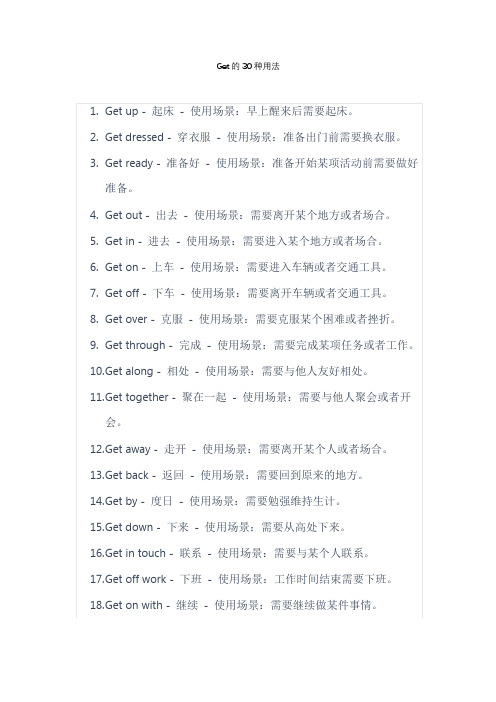
17.Get off work -下班-使用场景:工作时间结束需要下班。
18.Get on with -摆脱-使用场景:需要摆脱某个困境或者不好的情况。
20.Get rid of -摆脱-使用场景:需要摆脱某个物品或者不好的情况。
21.Get together with -与某人聚会-使用场景:需要与某人聚会。
22.Get up to -做某事-使用场景:需要做某件事情。
23.Get a grip -控制-使用场景:需要控制自己的情绪或者行为。
24.Get a life -过好生活-使用场景:需要过好自己的生活。
25.Get a move on -快点-使用场景:需要加快速度或者赶时间。
26.Get ahold of -联系-使用场景:需要联系某个人或者机构。
27.Get ahead -超越-使用场景:需要超越他人或者自己。
28.Get away with -逃脱惩罚-使用场景:需要逃脱惩罚或者责任。
29.Get back to -回复-使用场景:需要回复某人的信息或者邮件。
30.Get by with -度日-使用场景:需要勉强维持生计。
Get的30种用法
1.Get up -起床-使用场景:早上醒来后需要起床。
2.Get dressed -穿衣服-使用场景:准备出门前需要换衣服。
3.Get ready -准备好-使用场景:准备开始某项活动前需要做好准备。
4.Get out -出去-使用场景:需要离开某个地方或者场合。
5.Get in -进去-使用场景:需要进入某个地方或者场合。
6.Get on -上车-使用场景:需要进入车辆或者交通工具。
get的所有用法
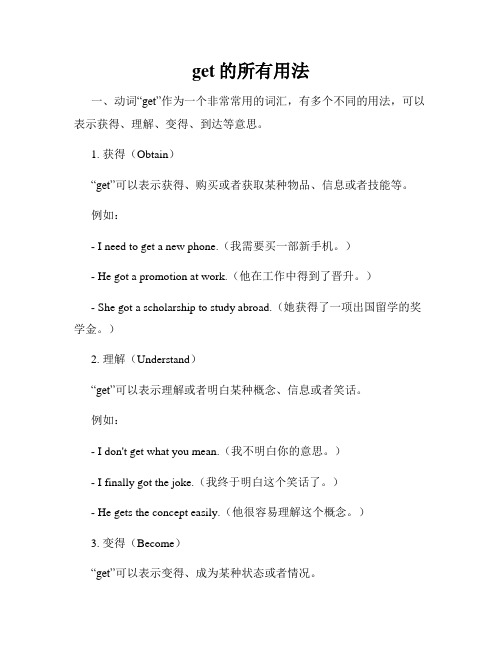
get的所有用法一、动词“get”作为一个非常常用的词汇,有多个不同的用法,可以表示获得、理解、变得、到达等意思。
1. 获得(Obtain)“get”可以表示获得、购买或者获取某种物品、信息或者技能等。
例如:- I need to get a new phone.(我需要买一部新手机。
)- He got a promotion at work.(他在工作中得到了晋升。
)- She got a scholarship to study abroad.(她获得了一项出国留学的奖学金。
)2. 理解(Understand)“get”可以表示理解或者明白某种概念、信息或者笑话。
例如:- I don't get what you mean.(我不明白你的意思。
)- I finally got the joke.(我终于明白这个笑话了。
)- He gets the concept easily.(他很容易理解这个概念。
)3. 变得(Become)“get”可以表示变得、成为某种状态或者情况。
例如:- She got angry when she heard the news.(她听到这个消息后生气了。
)- The weather is getting colder.(天气越来越冷了。
)- He got tired after running for an hour.(他跑了一个小时后累了。
)4. 到达(Reach)“get”可以表示到达某个地方或者抵达某个目的地。
例如:- We got home very late last night.(我们昨晚很晚才回家。
)- What time do you usually get to work?(你通常几点到达上班地点?)- They finally got to the top of the mountain.(他们终于到达了山顶。
)二、短语和习语除了上述基本用法外,下面是一些常见的“get”短语和习语:1. Get up(起床)- I usually get up at 7 o'clock.(我通常7点起床。
get的用法和短语例句
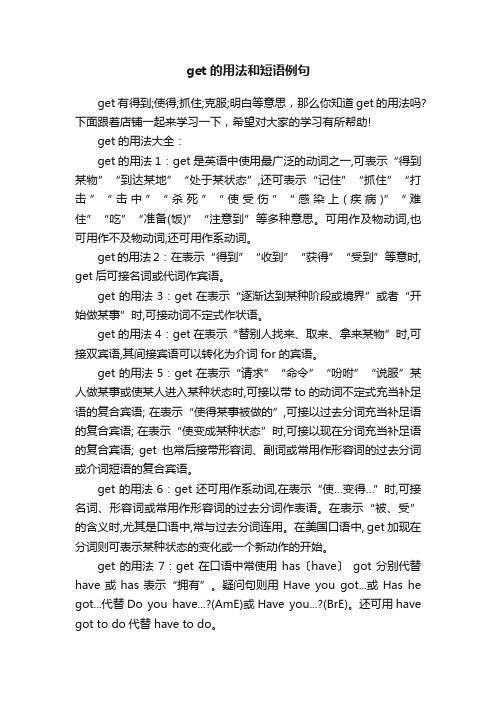
get的用法和短语例句get有得到;使得;抓住;克服;明白等意思,那么你知道get的用法吗?下面跟着店铺一起来学习一下,希望对大家的学习有所帮助!get的用法大全:get的用法1:get是英语中使用最广泛的动词之一,可表示“得到某物”“到达某地”“处于某状态”,还可表示“记住”“抓住”“打击”“击中”“杀死”“使受伤”“感染上(疾病)”“难住”“吃”“准备(饭)”“注意到”等多种意思。
可用作及物动词,也可用作不及物动词,还可用作系动词。
get的用法2:在表示“得到”“收到”“获得”“受到”等意时, get后可接名词或代词作宾语。
get的用法3:get在表示“逐渐达到某种阶段或境界”或者“开始做某事”时,可接动词不定式作状语。
get的用法4:get在表示“替别人找来、取来、拿来某物”时,可接双宾语,其间接宾语可以转化为介词for的宾语。
get的用法5:get在表示“请求”“命令”“吩咐”“说服”某人做某事或使某人进入某种状态时,可接以带to的动词不定式充当补足语的复合宾语; 在表示“使得某事被做的”,可接以过去分词充当补足语的复合宾语; 在表示“使变成某种状态”时,可接以现在分词充当补足语的复合宾语; get也常后接带形容词、副词或常用作形容词的过去分词或介词短语的复合宾语。
get的用法6:get还可用作系动词,在表示“使…变得…”时,可接名词、形容词或常用作形容词的过去分词作表语。
在表示“被、受”的含义时,尤其是口语中,常与过去分词连用。
在美国口语中, get加现在分词则可表示某种状态的变化或一个新动作的开始。
get的用法7:get在口语中常使用has〔have〕got分别代替have或has表示“拥有”。
疑问句则用Have you got...或Has he got...代替Do you have...?(AmE)或Have you...?(BrE)。
还可用have got to do代替have to do。
get的7种用法总结
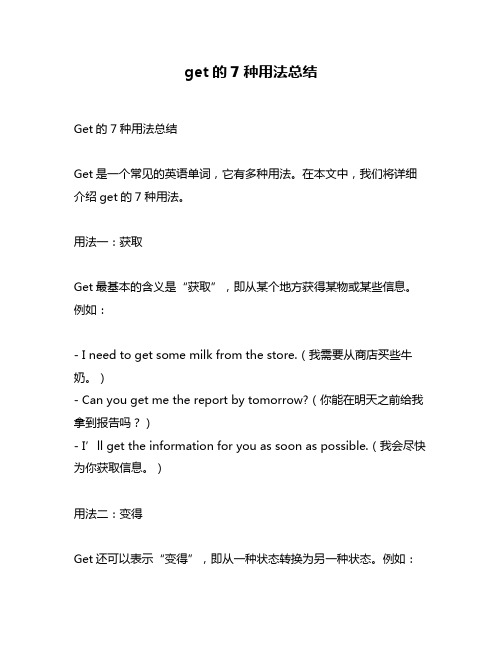
get的7种用法总结Get的7种用法总结Get是一个常见的英语单词,它有多种用法。
在本文中,我们将详细介绍get的7种用法。
用法一:获取Get最基本的含义是“获取”,即从某个地方获得某物或某些信息。
例如:- I need to get some milk from the store.(我需要从商店买些牛奶。
)- Can you get me the report by tomorrow?(你能在明天之前给我拿到报告吗?)- I’ll get the information for you as soon as possible.(我会尽快为你获取信息。
)用法二:变得Get还可以表示“变得”,即从一种状态转换为另一种状态。
例如:- She’s getting better after her surgery.(她在手术后变得越来越好了。
)- The weather is getting colder.(天气变得越来越冷了。
)- He’s getting more and more frustrated with his job.(他对工作越来越失望了。
)用法三:到达Get还可以表示“到达”,即到达某个地方或某个状态。
例如:- What time did you get to the office this morning?(你今天早上几点钟到办公室的?)- We finally got to the top of the mountain after hours of hiking.(经过数小时的徒步旅行,我们终于到达了山顶。
)- I can’t wait to get home and relax.(我迫不及待地想回家放松一下。
)用法四:理解Get还可以表示“理解”,即理解某个概念或某个问题。
例如:- I don’t get why he’s so upset about it.(我不明白他为什么那么生气。
get的七种用法
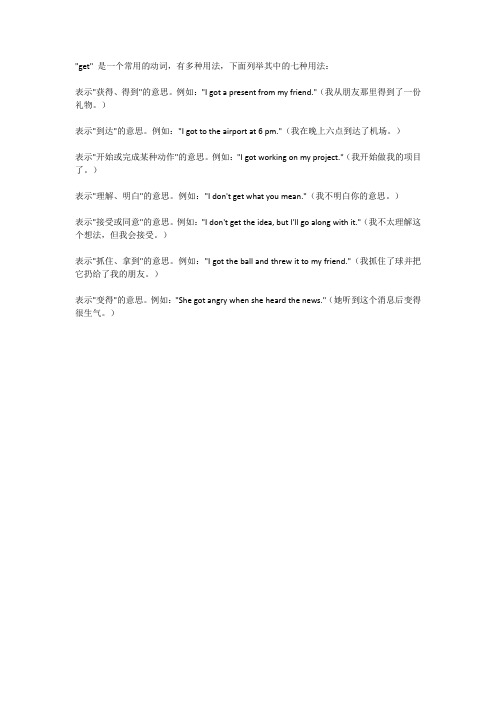
"get" 是一个常用的动词,有多种用法,下面列举其中的七种用法:
表示"获得、得到"的意思。
例如:"I got a present from my friend."(我从朋友那里得到了一份礼物。
)
表示"到达"的意思。
例如:"I got to the airport at 6 pm."(我在晚上六点到达了机场。
)
表示"开始或完成某种动作"的意思。
例如:"I got working on my project."(我开始做我的项目了。
)
表示"理解、明白"的意思。
例如:"I don't get what you mean."(我不明白你的意思。
)
表示"接受或同意"的意思。
例如:"I don't get the idea, but I'll go along with it."(我不太理解这个想法,但我会接受。
)
表示"抓住、拿到"的意思。
例如:"I got the ball and threw it to my friend."(我抓住了球并把它扔给了我的朋友。
)
表示"变得"的意思。
例如:"She got angry when she heard the news."(她听到这个消息后变得很生气。
)。
get动词用法
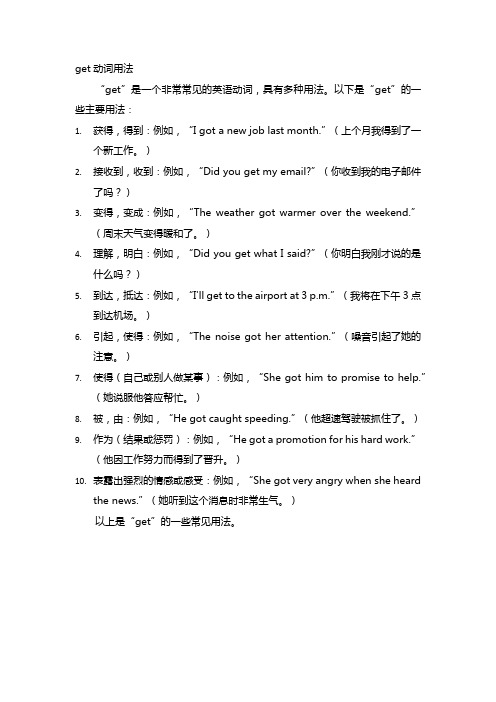
get动词用法
“get”是一个非常常见的英语动词,具有多种用法。
以下是“get”的一些主要用法:
1.获得,得到:例如,“I got a new job last month.”(上个月我得到了一
个新工作。
)
2.接收到,收到:例如,“Did you get my email?”(你收到我的电子邮件
了吗?)
3.变得,变成:例如,“The weather got warmer over the weekend.”
(周末天气变得暖和了。
)
4.理解,明白:例如,“Did you get what I said?”(你明白我刚才说的是
什么吗?)
5.到达,抵达:例如,“I'll get to the airport at 3 p.m.”(我将在下午3点
到达机场。
)
6.引起,使得:例如,“The noise got her attention.”(噪音引起了她的
注意。
)
7.使得(自己或别人做某事):例如,“She got him to promise to help.”
(她说服他答应帮忙。
)
8.被,由:例如,“He got caught speeding.”(他超速驾驶被抓住了。
)
9.作为(结果或惩罚):例如,“He got a promotion for his hard work.”
(他因工作努力而得到了晋升。
)
10.表露出强烈的情感或感受:例如,“She got very angry when she heard
the news.”(她听到这个消息时非常生气。
)
以上是“get”的一些常见用法。
get的所有用法
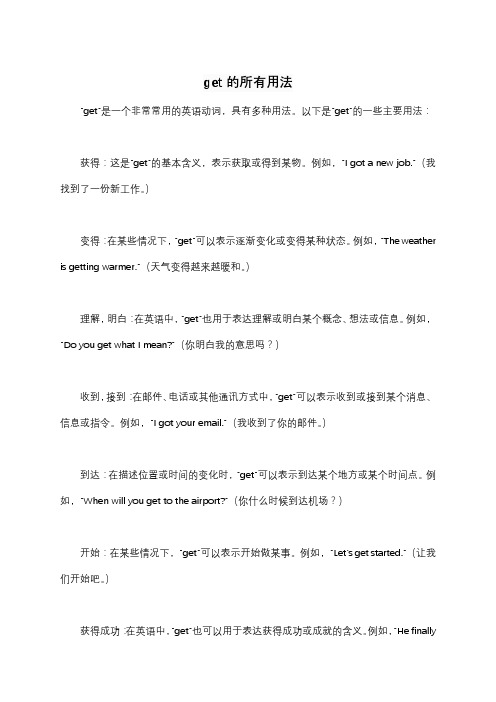
get的所有用法"get"是一个非常常用的英语动词,具有多种用法。
以下是"get"的一些主要用法:获得:这是"get"的基本含义,表示获取或得到某物。
例如,"I got a new job."(我找到了一份新工作。
)变得:在某些情况下,"get"可以表示逐渐变化或变得某种状态。
例如,"The weather is getting warmer."(天气变得越来越暖和。
)理解,明白:在英语中,"get"也用于表达理解或明白某个概念、想法或信息。
例如,"Do you get what I mean?"(你明白我的意思吗?)收到,接到:在邮件、电话或其他通讯方式中,"get"可以表示收到或接到某个消息、信息或指令。
例如,"I got your email."(我收到了你的邮件。
)到达:在描述位置或时间的变化时,"get"可以表示到达某个地方或某个时间点。
例如,"When will you get to the airport?"(你什么时候到达机场?)开始:在某些情况下,"get"可以表示开始做某事。
例如,"Let's get started."(让我们开始吧。
)获得成功:在英语中,"get"也可以用于表达获得成功或成就的含义。
例如,"He finallygot what he wanted."(他终于得到了他想要的东西。
)总的来说,"get"是一个非常灵活的动词,可以用于各种不同的语境和情况。
掌握好"get"的用法,对于提高英语口语和写作能力都非常重要。
get常见用法

get常见用法"get" 是一个英语动词,有多个常见的用法,以下是一些例子:1. 获取或得到某物:这是 "get" 最基本的用法。
例如,"I got a new car."(我买了一辆新车)。
2. 理解或领悟:可以表示某人理解了某事。
例如,"I finally got the joke."(我终于理解了这个笑话)。
3. 变得或成为:可以表示某人或某事发生了变化。
例如,"I got angry when he was late."(他迟到时,我生气了)。
4. 收到或接到:通常用于邮件、电话或其他形式的通信。
例如,"I got your email."(我收到了你的邮件)。
5. 到达某地:可以表示某人或某物到达了某个地方。
例如,"When will you get to my house?"(你什么时候会到我家?)6. 说服或使某人做某事:例如,"I got him to help me with the project."(我让他帮我做这个项目)。
7. 获得或赢得:例如,"He got first place in the race."(他在比赛中获得了第一名)。
8. 感染:可以表示某人被疾病或其他负面情况所影响。
例如,"She got the flu."(她得了流感)。
9. 经历或遭受:例如,"He got divorced last year."(他去年离婚了)。
10. 抓到或逮捕:在法律语境中,例如,"The police got the suspect."(警察逮捕了嫌疑人)。
以上只是 "get" 的一些常见用法,这个单词在不同的语境中还有许多其他含义和用法。
get用法总结以及短语

get用法总结以及短语“get”是英语中非常常用的动词,以下是它的用法总结和常用短语:- 表示“得到,获得”的意思,例如:- I got a new computer.(我得到了一台新电脑。
)- She got a promotion at work.(她在工作中得到了晋升。
)- 表示“到达,抵达”的意思,例如:- We got to the airport in time.(我们及时到达了机场。
)- He got home late last night.(他昨晚很晚才到家。
)- 表示“变得,成为”的意思,例如:- It's getting dark outside.(外面天色渐暗。
)- She got angry when I told her the truth.(我告诉她真相时,她生气了。
)- 表示“理解,明白”的意思,例如:- I didn't get what you said.(我没明白你说的话。
)- He finally got the point of the joke.(他终于明白了那个笑话的笑点。
)- 表示“抓住,逮捕”的意思,例如:- The police got the thief.(警察抓住了小偷。
)- 常用短语:- get along:相处,进展,如:How are you getting along with your new boss?(你和你的新老板相处得如何?)- get in:进入,插话,如:Can you get me in the meeting?(你能让我参加那个会议吗?)- get out of:逃避,摆脱,如:I need to get out of this town.(我需要离开这个城镇。
)- get over:克服,恢复,如:I hope you can get over your cold soon.(我希望你能尽快克服感冒。
最常见的get怎么用,5分钟掌握Get用法大全!
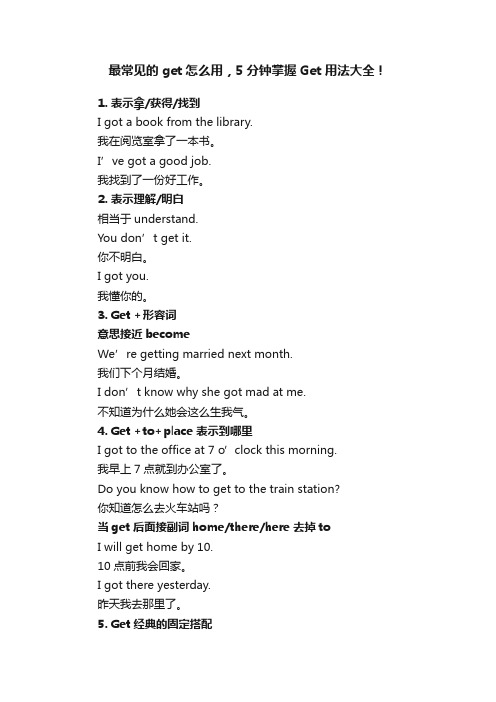
最常见的get怎么用,5分钟掌握Get用法大全!1. 表示拿/获得/找到I got a book from the library.我在阅览室拿了一本书。
I’ve got a good job.我找到了一份好工作。
2. 表示理解/明白相当于understand.You don’t get it.你不明白。
I got you.我懂你的。
3. Get +形容词意思接近becomeWe’re getting married next month.我们下个月结婚。
I don’t know why she got mad at me.不知道为什么她会这么生我气。
4. Get +to+place 表示到哪里I got to the office at 7 o’clock this morning.我早上7点就到办公室了。
Do you know how to get to the train station?你知道怎么去火车站吗?当get后面接副词home/there/here 去掉toI will get home by 10.10点前我会回家。
I got there yesterday.昨天我去那里了。
5. Get经典的固定搭配1) Get up 起床比如说I usually get up at 7 every morning.我每天早上通常在7点起床。
最熟悉的还有Get out出去等~2) get... across 横过/穿过/被理解/被接受How can I get my message across to the audience? 我该怎么做才能让观众更好的理解我的意思呢?3) get along+with+sb 和某人相处得来I don’t get along with my new colleagues.我和我的新同事相处得不是很好。
I get along well with my father-in-law.我和岳父相处得不错。
get的7种用法总结
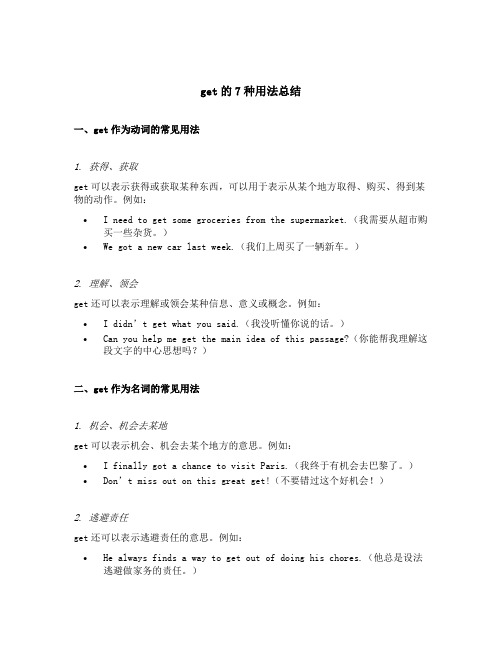
get的7种用法总结一、get作为动词的常见用法1. 获得、获取get可以表示获得或获取某种东西,可以用于表示从某个地方取得、购买、得到某物的动作。
例如:•I need to get some groceries from the supermarket.(我需要从超市购买一些杂货。
)•We got a new car last week.(我们上周买了一辆新车。
)2. 理解、领会get还可以表示理解或领会某种信息、意义或概念。
例如:•I didn’t get what you said.(我没听懂你说的话。
)•Can you help me get the main idea of this passage?(你能帮我理解这段文字的中心思想吗?)二、get作为名词的常见用法1. 机会、机会去某地get可以表示机会、机会去某个地方的意思。
例如:•I finally got a chance to visit Paris.(我终于有机会去巴黎了。
)•Don’t miss out on this great get!(不要错过这个好机会!)2. 逃避责任get还可以表示逃避责任的意思。
例如:•He always finds a way to get out of doing his chores.(他总是设法逃避做家务的责任。
)•She tried to get out of going to the party, but failed.(她试图逃避去派对,但失败了。
)三、get作为形容词的常见用法1. 到达、来get可以表示到达或来的意思。
它可以用于表示到达目的地、前往某个地点或到达某个状态。
例如:•What time did you get here?(你什么时候到这里的?)•The train gets to the station at 9 o’clock.(火车九点到达车站。
)2. 变得、开始变得get还可以表示变得或开始变得某种状态或程度。
动词get的用法
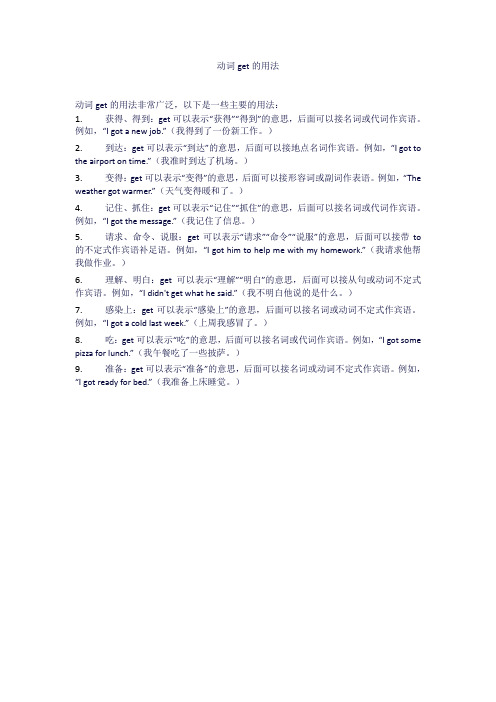
动词get的用法动词get的用法非常广泛,以下是一些主要的用法:1.获得、得到:get可以表示“获得”“得到”的意思,后面可以接名词或代词作宾语。
例如,“I got a new job.”(我得到了一份新工作。
)2.到达:get可以表示“到达”的意思,后面可以接地点名词作宾语。
例如,“I got to the airport on time.”(我准时到达了机场。
)3.变得:get可以表示“变得”的意思,后面可以接形容词或副词作表语。
例如,“The weather got warmer.”(天气变得暖和了。
)4.记住、抓住:get可以表示“记住”“抓住”的意思,后面可以接名词或代词作宾语。
例如,“I got the message.”(我记住了信息。
)5.请求、命令、说服:get可以表示“请求”“命令”“说服”的意思,后面可以接带to 的不定式作宾语补足语。
例如,“I got him to help me with my homework.”(我请求他帮我做作业。
)6.理解、明白:get可以表示“理解”“明白”的意思,后面可以接从句或动词不定式作宾语。
例如,“I didn't get what he said.”(我不明白他说的是什么。
)7.感染上:get可以表示“感染上”的意思,后面可以接名词或动词不定式作宾语。
例如,“I got a cold last week.”(上周我感冒了。
)8.吃:get可以表示“吃”的意思,后面可以接名词或代词作宾语。
例如,“I got some pizza for lunch.”(我午餐吃了一些披萨。
)9.准备:get可以表示“准备”的意思,后面可以接名词或动词不定式作宾语。
例如,“I got ready for bed.”(我准备上床睡觉。
)。
英语get的用法
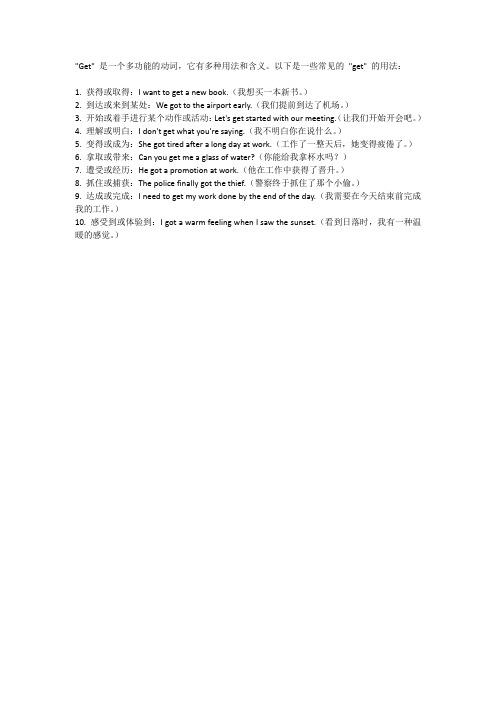
"Get" 是一个多功能的动词,它有多种用法和含义。
以下是一些常见的"get" 的用法:
1. 获得或取得:I want to get a new book.(我想买一本新书。
)
2. 到达或来到某处:We got to the airport early.(我们提前到达了机场。
)
3. 开始或着手进行某个动作或活动:Let's get started with our meeting.(让我们开始开会吧。
)
4. 理解或明白:I don't get what you're saying.(我不明白你在说什么。
)
5. 变得或成为:She got tired after a long day at work.(工作了一整天后,她变得疲倦了。
)
6. 拿取或带来:Can you get me a glass of water?(你能给我拿杯水吗?)
7. 遭受或经历:He got a promotion at work.(他在工作中获得了晋升。
)
8. 抓住或捕获:The police finally got the thief.(警察终于抓住了那个小偷。
)
9. 达成或完成:I need to get my work done by the end of the day.(我需要在今天结束前完成我的工作。
)
10. 感受到或体验到:I got a warm feeling when I saw the sunset.(看到日落时,我有一种温暖的感觉。
)。
get的五种用法你get了吗?

get的五种用法你get了吗?Get 一词虽小,但它的用法却不少,为高考出现频率较高的一词汇之一,所谓高频词汇指的是一些词性多,意思多,用法多的三多词汇。
GET概括起来有以下五种用法。
一、Get 作为不及物动词Get 作为不及物动词是到达的意思,不及物动词后面一般接副词,如get there,如果有后续有名词,其后面都在加上适当的介词,构成get to +地点这一结构。
而get home,不用加介词,因为home一词可以为副词。
二、Get 作为及物动词Get 作为及物动词为得到的意思,可以直接接宾语,例如:He got a prize last week.上周他拿了一个奖.三、Get 作为连系动词Get 作为连系动词为变得的意思,其后面跟表语。
例如:It gets warmer and warmer when spring comes.当春天来了,天气变得越来越暖了.四、Get 作为使役动词英语中使役动词是表示使、令、让、帮、叫等意义的动词,使役动词除了要带宾语外,还需要带上宾语补语意思才能完整。
例如:Before driving into the city,you are required to get your car washed.五、Get 作为替代动词Get 作为替代动词可用来替代构成被动词语态的be动词。
例如:In fact, most people do good work and then get promoted into a position they've shown no aptitude for.除了以上五种用法外,Get还可以构成很多固定短语,如:get along 进行,相处get back回来,找回get down记下来,打下来get over 克服 get on 上(火车,公共汽车等),相处,进行get off 下(火车,公共汽车等)起飞,不惩罚get rid of 消灭,摆脱,除掉get out 拔出,洗掉,传出去get up 起床,起身get to 到达get round 传开 get in touch with 和…..取得联系。
get用法总结

get用法总结以下是关于“get”的用法总结、固定搭配以及双语例句:**一、基本用法**1. “get”作为及物动词,意为“得到,获得”- 例如:I got a new book yesterday.(我昨天得到了一本新书。
) - Did you get the job? (你得到那份工作了吗?)2. “get”作连系动词,意为“变得”- 例如:The weather is getting colder.(天气变得更冷了。
)- She got angry when she heard the news.(当她听到这个消息时,她生气了。
)3. “get”与介词或副词构成短语动词**二、固定搭配**1. get up 起床- I always get up early in the morning. (我早上总是起得很早。
) - Why did you get up so late today? (你今天为什么起这么晚?)2. get on 上车;进展- Let's get on the bus. (我们上车吧。
)- How are you getting on with your work? (你的工作进展如何?)3. get off 下车- Don't forget to get off at the next stop. (别忘了在下一站下车。
) - We got off the train and had a rest. (我们下了火车,休息了一会儿。
)4. get along/on (with) 与......相处;进展- I get along well with my classmates. (我和同学们相处得很好。
) - How are you getting along with your new colleagues? (你和新同事相处得怎么样?)5. get away 离开;逃脱- They managed to get away from the dangerous place. (他们设法离开了那个危险的地方。
get 用法
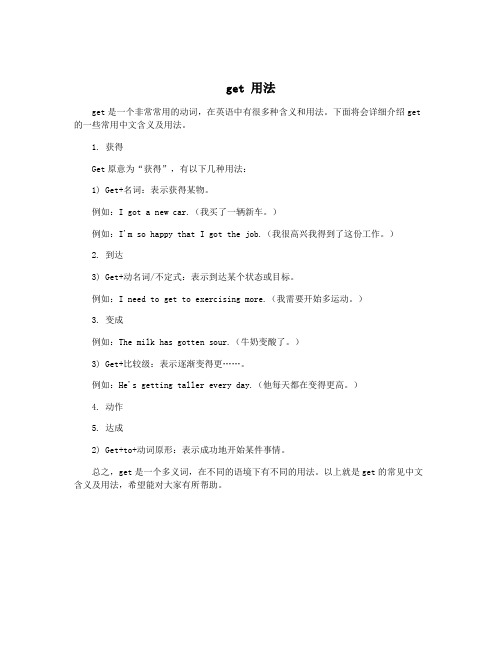
get 用法
get是一个非常常用的动词,在英语中有很多种含义和用法。
下面将会详细介绍get 的一些常用中文含义及用法。
1. 获得
Get原意为“获得”,有以下几种用法:
1) Get+名词:表示获得某物。
例如:I got a new car.(我买了一辆新车。
)
例如:I'm so happy that I got the job.(我很高兴我得到了这份工作。
)
2. 到达
3) Get+动名词/不定式:表示到达某个状态或目标。
例如:I need to get to exercising more.(我需要开始多运动。
)
3. 变成
例如:The milk has gotten sour.(牛奶变酸了。
)
3) Get+比较级:表示逐渐变得更……。
例如:He's getting taller every day.(他每天都在变得更高。
)
4. 动作
5. 达成
2) Get+to+动词原形:表示成功地开始某件事情。
总之,get是一个多义词,在不同的语境下有不同的用法。
以上就是get的常见中文含义及用法,希望能对大家有所帮助。
Get的用法和口语

Get的⽤法和⼝语Get的⽤法get的搭配很多,但在每种搭配中get的意义是不完全相同的。
⼤多数情况下,get是及物动词,有时它也可以起连系动词的作⽤。
1.get+sb.(sth.)叫来某⼈,弄到事物. Please go and get him.去把他叫来。
She got high marks in the final examination.2.get+sb.+st.为某⼈弄到事物Will you please get me a ticket for the football match?请给我弄张⾜球赛票好吗?He got me some beautiful postcards.他⼤帮我弄到⼀些漂亮的明信⽚。
3.get+sth.+adj.使某物处于某种状态。
We have got everything ready for the sports meet.我们已经为运动会做好了⼀切准备。
She got her school clothes dirty.她把校服弄脏了。
4.get+sth.+done使某事被做You must get your homework done before you watch TV.你看电视前务必把家庭作业完成。
You'd better go and get your hair cut.你最好去理个发。
5.get+sb.(sth.)+doing让某⼈(物)⾏动起来。
My duty was to get the four of us studying the subject.我的责任是使我们四个⼈研究这个主题。
Who can get the machine running?谁能启动这台机器?6.get+sb.+to do使某⼈做某事My idea is that we should get a porter to carry our luggage.我的想法是我们得请个搬运⼯来搬运⾏李。
get的用法归纳总结

get的用法归纳总结get的用法有以下几种:1. 表示获得、收到、得到:- I got a present from my friend.(我从朋友那里收到了一份礼物。
)- Did you get my message?(你收到我的信息了吗?)- She got a promotion at work.(她在工作中得到了晋升。
)2. 表示到达、达成:- What time did you get home last night?(你昨晚什么时候到家的?)- I’m trying to get a deal with that company.(我正试图与那家公司达成一笔交易。
)- They finally got the agreement they were looking for.(他们最终达成了他们一直想要的协议。
)3. 表示变得、变成:- The weather is getting worse.(天气变得越来越糟糕。
)- She got angry when she heard the news.(她听到那个消息后变得生气了。
)- He got sick after eating the seafood.(他吃了海鲜之后生病了。
)4. 表示做、采取行动:- I need to get some exercise.(我需要进行一些锻炼。
)- Let’s get dinner tonight.(我们今晚一起出去吃饭吧。
)- She got a new job and started working immediately.(她得到了新工作并立即开始工作。
)5. 表示理解、记住:- I don’t get it.(我不理解。
)- I finally got the math problem.(我终于理解了这个数学问题。
)- Can you get his phone number for me?(你能帮我记住他的电话号码吗?)6. 表示召集、安排:- Let’s get a meeting together to discuss the project.(让我们安排一次会议来讨论这个项目。
- 1、下载文档前请自行甄别文档内容的完整性,平台不提供额外的编辑、内容补充、找答案等附加服务。
- 2、"仅部分预览"的文档,不可在线预览部分如存在完整性等问题,可反馈申请退款(可完整预览的文档不适用该条件!)。
- 3、如文档侵犯您的权益,请联系客服反馈,我们会尽快为您处理(人工客服工作时间:9:00-18:30)。
/ɡet,gɛt/ v. S1 W1英 [ɡet]pt: got pp: got gotten pres part: gettingMEANINGS 义项1.RECEIVE 收到[T not in passive,不用被动态] to receive something that someone gives you or sends you收到,接到•She got loads of presents. 她收到了许多礼物。
•W hat did you get for Christmas? 你圣诞节收到了什么礼物?•We get a lot of junk mail. 我们收到许多垃圾邮件。
•I got a few games free when I bought my computer. 我买电脑的时候得到了几个免费的游戏。
get sth from sb•We got a letter from Pam this morning. 今天早上我们收到了帕姆的来信。
get sth off sb•I got it off my Dad. 这是我从我爸那里拿来的。
2.OBTAIN 获得[T] to obtain something by finding it, asking for it, or paying for it〔通过寻找、要求或出钱〕获得,得到•We need to get help quickly! 我们需要马上得到帮助!•It would be a good idea to get professional advice. 征求专业人士的意见,这个主意很好。
•You ma y be able to get a grant from the local authority. 你也许可以从当地政府获得拨款。
•He cleared his throat to get our attention. 他清清嗓子来引起我们的注意。
get sth for sb•I want you to get some information for me. 我要你去给我找一些资料来。
get sb sth•His father managed to get him a job at the local factory. 他父亲想办法在当地的这家工厂里给他找了份工作。
3.BRING 带来[T] to bring someone or something back from somewhere带来,去取,去拿THESAURUSBRING•Run upstairs and get a pillow. 赶紧去楼上拿个枕头来。
•I went back into the office to get a pen. 我回办公室拿了一支钢笔。
•Shall I go and get the phone book? 要我去把电话号码簿拿来吗?get sb/sth from sth•She’s just gone to get the kids from school. 她刚去学校接孩子了。
get sth for sb•I’ll get a towel for you. 我给你拿块毛巾来。
get sb sth•I’ll get you a chair. 我给你搬把椅子来。
4.BUY 购买[T]to buy something 买,购买•Where did you get that jacket? 你那件夹克衫是哪里买的?•It’s a lovely coat, and I managed to get it cheap in the sales. 这件外套很漂亮,我是减价的时候买的,很便宜。
get sth for sb•Joe’s going to get tickets for all of us. 乔要去给我们大家买票。
get sb sth•While you’re out, could you get me some batteries? 你出去时给我买几节电池好吗?get yourself sth•He’s just got himself a new van. 他刚刚给自己买了一辆新的厢式货车。
get sth from sth•I usually get vegetables from the supermarket. 我一般在这家超市里买蔬菜。
get sth for $20/£100/50p etc•You can get a decent PC for about £500 now. 现在大约500英镑就可以买一台不错的个人电脑了。
to pay for something for someone else 为…付钱•I’ll get these drinks. 这些饮料我来付钱。
to buy a newspaper regularly 〔定期〕购买〔报纸〕•My parents always used to get the ‘Daily Telegraph’. 我父母以前总是买《每日电讯报》。
5.MONEY 钱[T]to receive money for doing work 挣,赚•Hospital doctors get a minimum of £50,000 a year. 医院的医生一年起码挣5万英镑。
get £2,000/$4,000 etc for doing sth•He gets £4 an hour for stacking shelves. 他给货架上货一小时挣4英镑。
to receive money when you sell something 卖得•Did you get a good price for it? 你卖到好价钱了吗?get £100/$200 etc for sth•You should get a couple of hundred pounds for your old car. 你的旧车应该可以卖几百英镑。
6.HAVE A FEELING/IDEA 有某种感觉/想法[T] to start to have a feeling or an idea产生,获得〔某种感觉或想法〕•She b egan to get an uncomfortable feeling that she was being watched. 她开始有一种不安的感觉,觉得有人在监视她。
•I got a terrible shock when I saw how ill he looked. 看到他病成这样,我大吃一惊。
•I got the impression that everyone was fed up with us. 我感觉到大家对我们厌烦了。
get pleasure from/out of sth•She gets a lot of pleasure from her garden. 她从自己的花园里获得很多乐趣。
7.HAVE/EXPERIENCE 有/经历[T] to have, do, or experience something有;经历•You don’t get enough exercise. 你锻炼得不够多。
•I never get time to read these days. 这些日子我根本没有时间看书。
•The west of the cou ntry gets quite a lot of rain. 该国西部地区经常下雨。
•We might get the chance to go to America this year. 今年我们可能有机会去美国。
8.ILLNESS 疾病[T not in passive,不用被动态] to catch an illness患上,得〔病〕•I got flu last winter and was in bed for three weeks. 去年冬天我得了流感,在床上躺了三个星期。
•She was worried she might get food poisoning. 她担心自己可能会食物中毒。
9.ACHIEVE 取得[T] to achieve something取得〔成绩〕•I got 98% in my last maths test. 上一次数学考试我得了98分。
•the person who gets the highest score 得分最高的人10.RECEIVE A PUNISHMENT 受到惩罚[T] to receive something as a punishment受到〔惩罚〕•He got ten years in prison for his part in the robbery. 他因参与抢劫被判刑十年。
11.ARRIVE 到达[I always + adv/prep] to arrive somewhere到达THESAURUSARRIVE•What time will we get there? 我们什么时候可以到那里?•We didn’t get home until midnight. 我们半夜才到家。
[+ to]•We got to Paris that evening. 那天晚上我们到了巴黎。
12.REACH A POINT 达到某一点[I always + adv/prep] to reach a particular point or stage of something达到〔某一点或某一阶段〕•I’ve got as far as chapter 5. 我已经看到第5章了。
•I couldn’t wait to get to the end of the book. 我迫不及待地想把书看完。
•Where have you got up to in the story? 这小说你看到哪里了?•It was disappointing to lose, having got this far in the competition. 比赛到了这一步却输掉了,真是让人失望。
13.get (sb) somewhere/anywhere/nowhereif you get somewhere, or if an action gets you somewhere, you make progress(某人)有所进展/有任何进展/没有进展•I think we’re getting somewhere at last. 我想我们终于有了一些进展。
